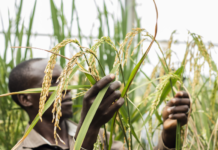
The Kenya national food fortification reference laboratory has been launched to aid in addition of essential micronutrients in the widely consumed stable foods such as wheat and maize flour, salt and edible oils.
The laboratory that was constructed and equipped by funds from the European Union (EU) under the ‘Strengthening the Kenya National Food Fortification Programme’ being implemented by Jomo Kenyatta University of Agriculture (JKUAT) and the Ministry of Health.
According to Henriette Geiger, EU Ambassador to Kenya, the facility reflects the EU values on international partnerships aimed at reducing inequality while promoting research based decision making.
“With this facility, EU now has the largest public research laboratory where other universities can utilise to realise local and global development aspirations in partnerships with their European counterparts,” said Geiger during the unveiling of the facility at JKUAT last week.
The ambassador further urged targeted research and technology transfer in sustainable agriculture and preservation of livelihoods within arid and semi-arid areas, in the backdrop of climate change.
Overseeing and accessing quality of fortified foods
Susan Nakhumicha, Health Cabinet Secretary commended the establishment of the laboratory at JKUAT, emphasizing its role in enabling the government to oversee and assess the quality of fortified foods.
This, she stated, is crucial for ensuring that these products adhere to the necessary standards and safety regulations.
“Current results indicate improvement in fortification compliance for maize flour from 16% (2017) to 46% (2022) and wheat flour from 18% (2017) to 84% (2022),” said the CS in a message delivered on her behalf by Deputy Director of Health, Dr. Sultani Matendechero.
In addressing the audience, Matendechero highlighted the persistent challenge of fortifying maize flour, attributing it to the industry’s complexity, particularly the involvement of micro-millers (posho mills) who process non-packaged maize for community consumption.
Supporting research and innovation
Prof. Victoria Wambui Ngumi, JKUAT Vice Chancellor, said that the EU has become a key development partner of JKUAT in supporting the research and innovation enterprise.
“In addition to funding the construction of the Food Fortification Laboratory, the EU is supporting various projects tackling critical global challenges, such as climate change,” said Prof Ngumi.
The VC emphasized that the laboratory aligns with JKUAT’s commitment to address societal issues through the generation of new knowledge, food analysis, and industry training.
“We have taken a significant step in backing initiatives for rice fortification and established the laboratory as a benchmark for flour blending,” he added.
Hassan Abdi Mohammed, Chairman of the JKUAT Council, highlighted the laboratory’s accreditation by the Kenya Bureau of Standards, enabling industry and market-level sampling of flour to ensure compliance with national food fortification and safety standards.
Acknowledging the significance of public-private partnerships, the Council Chair expressed gratitude for the collaboration and







